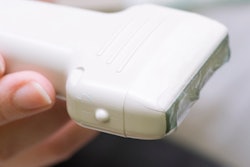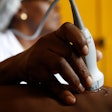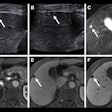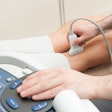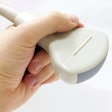
NEW YORK CITY - Few emergency departments (EDs) at U.S. Department of Veterans Affairs (VA) hospitals are using point-of-care ultrasound (POCUS) for most of the modality's recommended applications, according to research presented on Monday at the American Institute of Ultrasound in Medicine (AIUM) annual meeting.
After surveying all VA hospitals in 2016, a multi-institutional team of researchers found that nearly two-thirds of VA EDs were using the modality for at least one core POCUS application as defined in national guidelines. However, only one in 10 VA EDs were performing POCUS for 15 or more core applications, and more than one-third weren't using POCUS at all, according to presenter Dr. Jeremy Boyd from Vanderbilt University and Tennessee Valley Healthcare System - Nashville.
A standard of care
Over the past 15 years, POCUS has become the standard of care for certain applications in the emergency environment. However, only 45.5% of VA ED physicians are board-certified in emergency medicine, which requires POCUS training, according to Boyd.
The researchers set out to explore the current utilization POCUS in VA hospital EDs. They also wanted to assess the needs and desires for POCUS training in EDs with and without POCUS, as well as identify the barriers to POCUS usage. An electronic survey was developed by a multidisciplinary technical advisory group consisting of experts from emergency medicine, critical care, and hospital medicine, Boyd said.
All 144 VA facilities nationwide received the survey, which was targeted at chiefs of staff and service line chiefs -- or departmental chairs -- that were identified by the chiefs of staff as being POCUS users. After collecting the survey data between April 7, 2016, and July 25, 2016, the researchers calculated the frequency of POCUS use and also performed a subgroup analysis of emergency medicine services.
The survey queried the facilities on the use of the following core POCUS applications:
- Cardiac (pericardial effusion, left ventricular function, and volume status)
- Pulmonary (pleural effusion, pneumothorax, and pulmonary edema)
- Abdominal (biliary, peritoneal fluid, hydronephrosis, urinary retention, and pregnancy)
- Vascular (abdominal aortic aneurysm and deep vein thrombosis)
- Other (fractures, cellulitis, foreign body, abscess, joint effusion, optic nerve sheath, and central line placement)
The survey had a 100% response rate from the chiefs of staff and a 74% response rate from VA emergency medicine chiefs.
Rural, regional differences
Of the EDs, 62% used POCUS for at least one core application; only 10% used POCUS for 15 or more applications. However, 38% didn't use POCUS at all, Boyd said.
Few of the rural VA EDs used POCUS, the researchers found. Of the nine rural VA EDs, three (33%) used POCUS and six (66%) did not. In contrast, 58 (64%) of the 90 urban VA EDs used POCUS and 32 (36%) did not.
They also discovered some geographic regional differences in POCUS utilization.
| Regional difference in POCUS use at VA EDs | |||||
| Uses POCUS | Pacific region (18 VA EDs) | North Atlantic region (29 VA EDs) | Southeast region (18 VA EDs) | Midwest region (20 VA EDs) | Continental region (14 VA EDs) |
| Yes | 83% | 62% | 61% | 55% | 43% |
| No | 17% | 38% | 39% | 45% | 57% |
The VA EDs that didn't use POCUS were significantly more likely to be smaller and lower-volume facilities, the researchers noted. The two most frequently reported barriers to use were a lack of trained providers and a lack of ultrasound equipment.
Training needs
Of the 61 VA EDs that used POCUS, training was most desired in central line placement, abdominal aortic aneurysms, deep vein thrombosis, pericardial effusion, and biliary applications, Boyd said. Significantly, current POCUS use was associated with an increased interest in further training for the majority of applications.
"If you use point-of-care ultrasound, you want more training in it," Boyd said. "This stuff is addictive."
Conversely, facilities that do not use POCUS tended to have less desire for training, according to the researchers.





